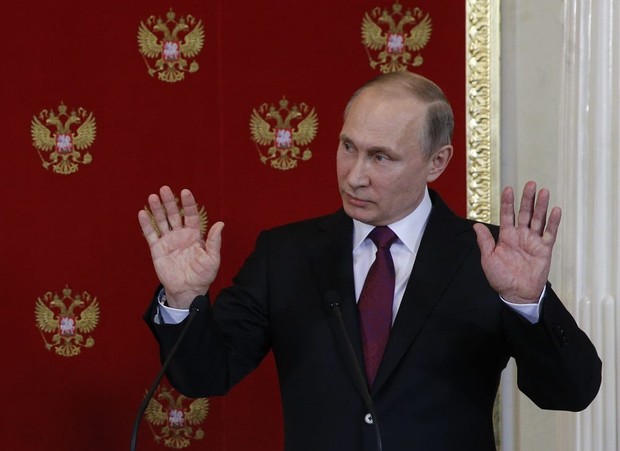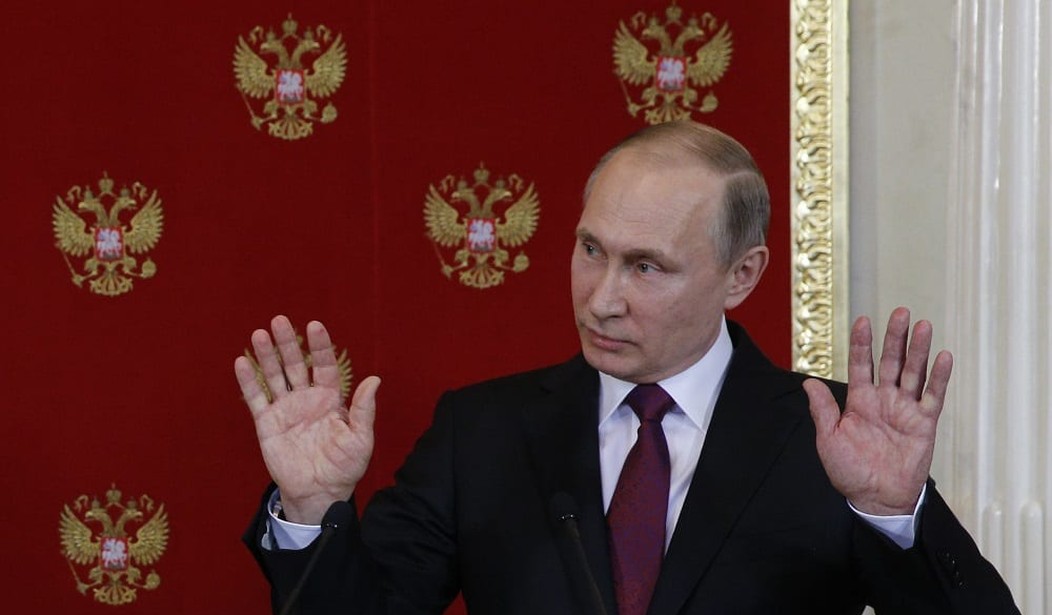
Russian President Vladimir Putin reacts during a joint press conference with Italian counterpart Sergio Mattarella after a meeting in Moscowís Kremlin, Russia, Tuesday, April 11, 2017. Sergio Mattarella is in Russia on an official visit. (Sergei Chirikov/ Pool photo via AP)
“When people see a strong horse and a weak horse, by nature, they will like the strong horse.”
–Osama bin Laden, terrorist mastermind and, as it turned out, prophet.
One of the many signature accomplishments of the Obama administration was inviting Russia to take a role in the war in Syria. If one were writing a John le Carre-style novel one could draw a straight line from our withdrawal from Iraq to the rise of ISIS to the Arab Spring to our attempt to overthrow Assad to the rise of ISIS to the increase of Iranian power to using the Russians as our intermediary with Iran to negotiate the now-defunct Iran nuclear deal to a Russian military presence in Syria.
But as Iran’s power has grown in the region and it looks more and more intent upon creating a Shia empire stretching from Tehran to the Mediterranean, it has become an existential threat to Israel. Israel has struck at Iranian bases in Syria and the intermixing of Russian and Iranian assets has now become a liability. Two days ago, Israel told Russia that it would no longer confine its attacks to Iranian targets along the Syria-Israel frontier but would now target them throughout Syria.
Israel has told Russia that it will broaden its military operations against Iranian positions in Syria to include the entire country, an international Arabic newspaper reported over the weekend.
According to London-based Asharq al-Awsat, Israel has decided to expand its “red lines” in Syria and will no longer confine itself to the area near its southern border. Israel has been cited as the source of numerous air and missile strikes in the country on sites connected to Iran and its Lebanese terror proxy Hezbollah.
Now Russia is trying to extract its Iranian client/master (because the Russo-Iranian relationship has Russia both leading and being the toady to the Iranians) from a no-win predicament. Iran can’t stay in southern Syria because they can’t project the force necessary to either deter Israeli attacks or to defend their own forces. They can’t leave, because to be seen as being booted out by the Jews would destroy the aura of invincibility and inevitability that Iran has tried to develop around its march to the sea.
Israeli political and military leaders believe Russia is willing to discuss a significant distancing of Iranian forces and allied Shi’ite militias from the Israel-Syria border, Israeli officials say.
The change in Russia’s position has become clearer since Israel’s May 10 military clash with Iran in Syria and amid Moscow’s concerns that further Israeli moves would threaten the stability of Syrian President Bashar Assad’s regime.
Russia recently renewed efforts to try to get the United States involved in agreements that would stabilize Syria. The Russians might be willing to remove the Iranians from the Israeli border, though not necessarily remove the forces linked to them from the whole country.
Russia, too, is dealing with a public relations problem. It is trying to link a withdrawal of Iranian forces from the Syrian border with a withdrawal of US forces around al-Tanf–this was the location where Russian mercenaries got the snot beat out of them by US forces back in February. Without some sort of face-saving deal, Russian prestige will suffer and the Iranians will start thinking the Russians are looking for an exit. And they are.
What had started out as a venture to procure a Mediterranean port and supporting logistics facilities and airbases to project Russian naval power into the Eastern Med has become an oozing ulcer, costing Russia cash and lives.
None of this just happened.Leon Hadar has an interesting article in The National Interest called Trump’s Strategy for the Middle East Is Working. In it he juxtaposes the way Middle East crises used to work and the deft change of calculus made by Trump (I’m using Trump as a metaphor for his administration because guys like Mattis and Bolton and Pompeo have watched the Middle East for a while).
Remember the days when any sign of growing tensions in the Middle East, not to mention a new act of violence involving Arabs and Israelis, would have immediately triggered pressure on Washington to “do something” as soon as possible.
Doing nothing, U.S. officials were warned, could risk a full-blown regional war, outside intervention by global adversaries, oil embargoes, the collapse of pro-American Arab regimes, the survival of Israel, and perhaps even the end of the world as we know it.
As the rest of the nation’s international and domestic problems would be placed on the policy backburner, the U.S. president would make urgent phone calls to Middle Eastern leaders, as he and the rest of Washington would consider sending the Marines, dispatching American envoys to the Middle East, launching another “peace process” and perhaps even convening another “peace conference.”
This kind of American diplomatic hyperactivity in the Middle East would be followed by the deployment of U.S. peacekeeping troops and the provision of huge financial assistance packages, with the Americans being drawn into never-ending efforts to resolve unresolvable conflicts, continuing to raise the costs of U.S. intervention in the Middle East.
And you could always count on America’s European allies, in another demonstration of their free-riding on American power, to press the United States to “do something” and then criticize Washington’s policies as a way of pandering to the Middle Easterners (“See, we aren’t as pro-Israeli as the Americans”).
Now, it is the Russians in that position. Though I think Hadar goes to obscene lengths to not criticize the Obama administration–they are the ones that turned a routine Syrian massacre of political opponents into a regional war complete with genocide and ethnic cleansing–what has happened is completely right:
Although President Trump has yet to state a coherent foreign-policy doctrine (something that he shares with his predecessor), it seems that his idea of U.S. disengagement from the region has been to support Saudi Arabia and the other Arab-Sunni states and Israel to encourage them to use their military power to contain what they considered to be an Iranian threat to their security. At the same time, he supported allowing the Russians to establish some sort of stability in Syria, and make it possible for the United States to end its military presence in the Levant now that the Islamic State has been defeated.
It is interesting to note that many officials and pundits in Washington continue to operate under the belief that what happens or would happen in the Middle East, including the prospects for a military confrontation between Iran and Israel, depends on what the United States says and does.
Hence, the notion that the U.S. decision to withdraw from the Iran nuclear deal accelerated the military tensions between the Iranians and Israelis (because the Iranians were supposedly “humiliated” and the Israelis were “emboldened” by Trump’s abrogation of the 2015 accord.)
In fact, both sides are being driven by other considerations (Iran’s interest in exerting its influence in the region; Israel’s concerns over Iranian military presence across its border with Syria), and nothing that Washington would do is going to change their respective strategic calculations, short of deploying U.S. troops to Syria.
But this time around, the global actor that needs to be worried about the possibility of a military confrontation between Iran and Israel in Syria is Russia that recognizes that that could threaten its evolving Pax Russiana in the Levant.
President Putin would, therefore, need to use Russia’s military and diplomatic power, including his close personal ties with the Israeli and Iranian leader, to prevent that from happening. As the Americans learned in the past, that kind of diplomacy ends up being the target of criticism by all the major players, as Putin discovers that he has no choice but to bribe the Iranians and the Israelis, without receiving any gratitude from either side.
If Putin succeeds in his efforts, and convinces the Iranians and the Israelis to adhere to a set of rules of engagement in Syria. he would win a few diplomatic brownie points for averting an Iran-Israel war. If he fails, Russia and not the United States would be blamed the ensuing mess this time, allowing the Trump Administration to pick up the pieces, if it so desires.
And there is more:
But isn’t the withdrawal of the United States from the Joint Comprehensive Plan of Action (JCPOA), and the tough posture the Trump Administration has embraced in dealing with the Islamic Republic, run contrary to President Trump’s goal of reducing U.S. military presence in the Middle East since it supposedly would lead to a confrontation between the United States and Iran?
That is not necessarily the way President Trump sees it. He is counting on the Saudis and the Israelis, joined by Egypt, Jordan and the other Arab Gulf states to stand-up to the Iranians, by using their enormous military power to mention the high financial resources at their disposal, with the United States providing indirect intelligence and military assistance, and ready to intervene only as the “balancer of last resort.”
I think Hadar misses a larger point here. This forcing of the Arab states and Israel into an alliance, and this was a stated objective of Trump in his visit to Saudi Arabia–a visit that was overshadowed in some quarters by his participation in a sword dance and Toby Keith performing to an all-male audience–has defanged the Palestinians. They are seeing that no one really cares about them and while the Arab states are willing to say pleasing things, the Palestinian issue is a secondary concern to states fighting for their very lives against Iran. This is a generational, if not permanent, re-ordering of the Middle East.
At the same time, while much of the conventional wisdom has been that the opposition to revoking the by America’s European allies is driven by their business interests in Iran, the fact is that they, and in particular France and the other southern European countries, are even more concerned about the more direct threat that a nuclear Iran and its ballistic missiles could pose to their security. That explains why France was insisting on tougher restrictions on Iran during the negotiations over the JCPOA, and why French President Emanuel Macron is interested in working on some sort of a compromise that would prevent the Iranians from restarting their nuclear military program. He is fully aware that only the United States could guarantee such a deal.
And, amazingly, this is serving to reduce Germany’s ability to call the shots for the EU on how it relates to Iran.
In sixteen months the Trump administration has beaten ISIS to rags, forced Israel and Saudi Arabia into a virtual alliance, and has the Russians looking for the exit. This is not a bad start.
=========
=========
Like what you see? Then visit my story archive.
Follow @streiffredstate
I’m on Facebook. Drop by and join the fun there.
=========
=========














Join the conversation as a VIP Member